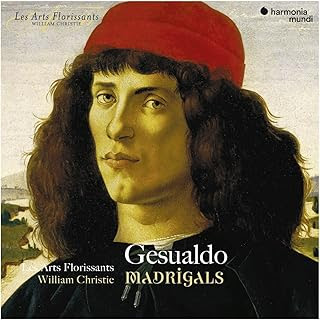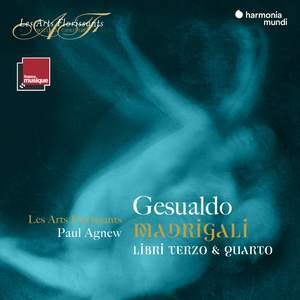Program: #21-10 Air Date: Mar 01, 2021
To listen to this show, you must first LOG IN. If you have already logged in, but you are still seeing this message, please SUBSCRIBE or UPGRADE your subscriber level today.
Three recent releases trace Gesualdo’s madrigal writing from Book 2 (1594) to Book 6 (1611).
I. Gesualdo: Secondo Libro di Madrigali (La Campagnia del Madrigale). Glossa CD GCD 922809.

The Second Book of Madrigals of Carlo Gesualdo provides the focal point for the latest in La Compagnia del Madrigale’s stunning reappraisals of the glories of the Italian madrigal on Glossa.
Probably written by Gesualdo between the time of the double honour killing of his first wife and her lover and his subsequent remarriage, the second book presents a sophisticated compositional mastery quite in keeping with the later books, albeit offering a calmer and gentler approach compared to the more tortured and twisted musical and psychological turns found in the last books.
Notwithstanding, much is required from the singers on the Secondo libro di madrigali a cinque voci and La Compagnia del Madrigale bring their muchpraised sensitivity to the text, balance of ensemble and dynamic control.
In the booklet, both Marco Bizzarini and Giuseppe Maletto investigate the state of mind of this fascinating composer, over four centuries since his death. The substantial second part to this recording offers a set of contrasts with Book 2: nine tracks devoted to madrigalists inspired by Gesualdo’s style, from contemporaries in Nenna, Macque and Palazzotto Tagliavia to the later Sigismondo d’India.
CARLO GESUALDO (1566-1613)
Secondo Libro di Madrigali
Ferrara, 1594
01 Se per lieve ferita 4:15
02 Non mi toglia il ben mio 1:49
03 Se così dolce è il duolo 2:46
04 Se taccio, il duol s’avanza 1:54
05 Caro amoroso neo 3:31
06 Candida man qual neve 2:55
07 Non è questa la mano 2:53
08 Dalle odorate spoglie 2:27
09 In più leggiadro velo 2:21
10 All’apparir di quelle luci 2:21
11 Hai rotto e sciolto 2:51
12 O come è gran martire 2:31
13 Sento che nel partire 3:27
14 Non mai, non cangerò 2:16
Additional tracks:
Pomponio Nenna (1556- 1608)
15 Mercè, grido piangendo [V Libro a 5, 1605] 2:54
Giovanni de Macque (c. 1548- 1614)
16 Tu ti lagni al mio pianto [VI Libro, 1613] 3:32
Pomponio Nenna
17 Oimè mi scacci [V Libro a 5, 1605] 2:14
18 Sospir, baci e parole [VII Libro a 5, 1609] 1:54
Giovanni de Macque
19 La mia doglia s’avanza [VI Libro, 1613] 2:52
Pomponio Nenna
20 Ecco, o dolce, o gradita [VI Libro a 5, 1607] 3:16
Giuseppe Palazzotto Tagliavia (1583-before 1653)
21 Ancidetemi cruda [II Libro, 1620] 3:09
Sigismondo d’India (c. 1582-1629)
22 Ecco morirò dunque [VII Libro, 1624] 5:17
Carlo Gesualdo
23 O dolorosa gioia [V Libro, 1611] 4:00
II. Carlo Gesualdo: Madrigaux à 5 Voix (Les Arts Florissants/William Christie). Harmonia Mundi CD HAF 8901268.

Love, desire and death – these are the three themes that pervade the musical poetry of Don Carlo Gesualdo, Prince of Venosa, which has become a byword for tortured emotion. These madrigals are the clearest depiction in his output of the torments of the soul, offering a faithful musical image of the ‘sweet poison’ which eats into lovers’ hearts . . .
|
Madrigaux À 5 Voix |
||
|
Libro III |
||
|
1 |
III. Ahi, Disperata Vita |
1:21 |
|
2 |
VIII. Sospirava Il Mio Core (Prima Parte) |
1:35 |
|
3 |
IX. O Malnati Messaggi (Seconda Parte) |
2:05 |
|
4 |
XI. Non T'Amo, O Voce Ingrata |
3:29 |
|
5 |
Canzon Francese Del Principe (Harp) |
6:00 |
|
Libro IV |
||
|
6 |
I. Luci Serene E Chiare |
3:14 |
|
7 |
XI. Sparge La Morte Al Mio Signor |
4:12 |
|
8 |
XVIII. Arde Il Mio Cor |
2:09 |
|
9 |
III. Io Tacerò (Prima Parte) / IV. Invan Dunque (Seconda Parte) (Harp And Lirone) |
4:12 |
|
Libro V |
||
|
10 |
IX. Occhi Del Mio Cor Vita |
3:25 |
|
11 |
XI. Mercè Grido Piangendo |
4:11 |
|
12 |
XIV. Asciugate I Begli Occhi |
3:05 |
|
13 |
XIII. Correte, Amanti (Harp And Theorbo) |
2:49 |
|
Libro VI |
||
|
14 |
I. Se La Mia Morte Brami |
3:01 |
|
15 |
VI. Io Parto |
2:52 |
|
16 |
XIII. Ardita Zanzaretta |
3:06 |
|
17 |
XIV. Ardo Per Te |
III. Gesualdo: Madrigali Libri Terzo & Quarto (Les Arts Florissants/Paul Agnew). Harmonia Mundi CD HAF 8905 309.10
Following the acclaim which met their 2-CD set devoted to the first two books of Gesualdo's madrigals (2020 Gramophone Award), Paul Agnew and Les Arts Florissants now focus on the composer's Ferrara period. Books III and IV mark a turning point in Gesualdo's output. The murderous prince's inner demons seem to be reflected in the heightened expressiveness of these madrigals, whose reliance on chromaticism and dissonance was so far ahead of it's time that it's like would not be heard again until centuries later.
From All Music Review: The facts of Carlo Gesualdo's life are perhaps as well known as his music: he caught his wife and her lover in the act, brutally murdered them both, fled her enraged family, and entered a life of seclusion where he pursued increasingly arcane and extreme musical experiments. A source of controversy with the present release may be that Les Arts Florissants director Paul Agnew argues in the booklet that the wildly experimental qualities of the last books of Gesualdo's madrigals, even found in the Book IV pieces included here, actually shouldn't be connected to the murder but were rather in the cards at the end of the long Italian madrigal tradition. Agnew has a certain amount of evidence on his side; other composers such as Luca Marenzio and the melodiously named Luzzasco Luzzaschi pursued the same kinds of innovations as Gesualdo did. Whatever one's position, these are unusually strong Gesualdo performances. What Agnew and his singers do that often eludes others is to pay attention to the texts, avoiding the agonized mannerisms common in the repertory and deploying just a hint of inflection toward speech instead of sung pitch where it's appropriate. The range of dynamics and phrasing is large -- listen to the deliciously quiet "Dolcissimo sospiro" -- and the listener's interest never flags over the substantial program. Les Arts Florissants have performed Gesualdo frequently, and they are well attuned to the tremendous tension in his music, the feeling of having no idea where the music will go next, no matter where that tension may actually have been coming from. If your Gesualdo collection is in need of a refresh from the classic recordings of Stravinsky's day, this is a fine choice; it is also a good place to start with Gesualdo for anybody.
- Voi volete ch'io mora: I. Voi volete ch'io mora 01:11
- Voi volete ch'io mora: II. Moro, o non moro? 02:22
- Ahi, disperata vita 01:48
- Languisco, e moro, ahi, cruda 03:44
- Del bel de' bei vostri occhi 02:30
- Ahi, dispietata e cruda 03:03
- Dolce spirto d’amore 02:36
- Sospirava il mio core: I. Sospirava il mio core 01:42
- Sospirava il mio core: II. O mal nati messaggi e mal intesi 02:38
- Veggio sì dal mio sole 02:27
- Non t'amo, o voce ingrata 02:13
- Meraviglia d'amore: I. Meraviglia d’amore 01:11
- Meraviglia d'amore: II. Ed ardo e vivo, dolc'aura gradita 01:55
- Crudelissima doglia 02:58
- Se piange ohimè la donna del mio core 03:12
- Ancidetemi pur, grievi martir i02:53
- Se vi miro pietosa 02:18
- Deh, se già fu crudele al mio martire 01:50
- Dolcissimo sospiro 02:56
- Donna, se m’ancidete 02:36
- Luci serene, e chiare 03:37
- Tal'hor sano desio 03:12
- Io tacerò, ma nel silentio mio: I. Io tacerò, ma nel silentio mio 02:45
- Io tacerò, ma nel silentio mio: II. In van dunque, o crudele 02:15
- Che fai meco, mio cor misero e solo 02:15
- Questa crudele, e pia 03:06
- Hor ch'in gioia credea viver contento: I. Hor ch'in gioia credea viver contento 01:06
- Hor ch'in gioia credea viver contento: II. O sempre crudo Amore 02:13
- Cor mio, deh, non piangete: I. Cor mio, deh, non piangete 01:25
- Cor mio, deh, non piangete: II. Dunque non m’offendete 02:28
- Sparge la morte al mio signor nel viso 04:26
- Moro, e mentre sospiro: I. Moro, e mentre sospiro 01:35
- Moro, e mentre sospiro: II. Quando di lui la sospirata vita 02:02
- Mentre gira costei 02:37
- A voi, mentre il mio core 02:07
- Ecco, morirò dunque: I. Ecco, morirò dunque01:30
- Ecco, morirò dunque: II. Ahi! già mi discoloro 02:22
- Arde 'l mio cor, ed è sì dolce il foco 02:50
- Se chiudete nel core 02:04
- Il sol, qual hor più splende: I. Il sol, qual hor più splende 01:07
- Il sol, qual hor più splende: II. Volgi mia luce, volgi entro 'l mio seno 02:10
Composer Info
Carlo Gesualdo (1566-1613), Pomponio Nenna (1556- 1608), Giovanni de Macque (c. 1548- 1614), Giuseppe Palazzotto Tagliavia (1583-before 1653), Sigismondo d’India (c. 1582-1629)
CD Info
Glossa CD GCD 922809, Harmonia Mundi CD HAF 8901268, Harmonia Mundi CD HAF 8905 309.10
